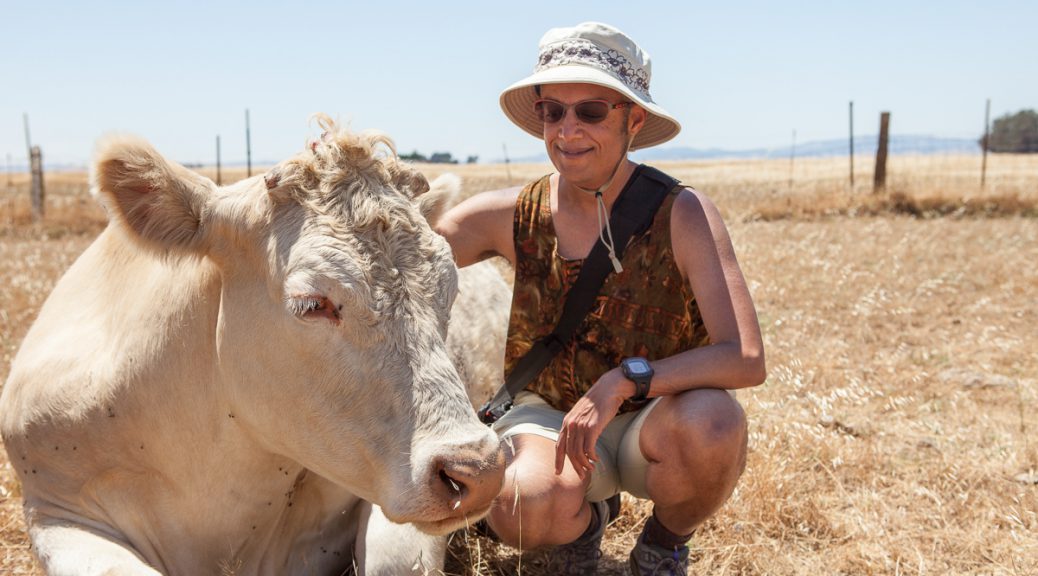[Image: Pax pets Shiva, a steer at PreetiRang Sanctuary. Photo by Ziggy.]
When I talk with non-vegans about veganism, one of the first questions they often ask me is “How long have you been vegan?” This is a well-meaning question, and some folks can answer it readily. Some went vegan instantly, perhaps after seeing a documentary like Earthlings. They might even celebrate the date on a “veganniversary” every year. A few, like Olympic athlete and activist Seba Johnson, have been vegan since birth.
But this question is somewhat harder for me to answer, and troubles me for a few reasons. Nowadays I often begin my response with, “It depends on your definition of vegan.” With a single, regrettable exception, which I’ll explain shortly, I stopped eating all dairy products and eggs for good in February 2011, having already stopped eating animal flesh in January 1992. I’d been trying to “go vegan” for that entire time, and referred to myself as vegan during the times when I avoided eating animal flesh, eggs, and dairy. But even after 2011, I continued to occasionally eat honey and wear some clothing containing wool, silk, or leather. I also occasionally visited zoos, and participated in animal exploitation in other ways.
In July 2014, when I read more about animal rights philosophy and decided to become an activist, I stopped using honey and other bee products, stopped wearing my remaining articles of animal-derived clothing, and made a commitment to stop visiting zoos and otherwise reduce my participation in animal exploitation as much as possible. I felt this was consistent with the Vegan Society definition of veganism:
Veganism is a way of living which seeks to exclude, as far as is possible and practicable, all forms of exploitation of, and cruelty to, animals for food, clothing or any other purpose.
That “any other purpose” is a very broad area, however, and that’s where some vegans start getting into battles over purity. Some will insist that palm oil isn’t vegan because its production destroys the habitat of orangutans, for example. On the flip side, some others who call themselves vegan see no problem eating the dairy, eggs, or even flesh of so-called “humanely” raised animals, or they consider eating fishes or other aquatic animals to be consistent with veganism.
I will not advocate for vegetarianism, “reduceitarianism”, “humane” or “sustainable” animal products , or any other choice that suggests it is OK to treat animals as property. But I’m much more troubled by people putting cow’s milk in their coffee than by them sweetening their tea with honey. And I’m much more bothered by the consumption of eggs, even from backyard farms, than by the wearing of an old wool jacket or leather shoes that haven’t worn out yet.
It’s important to note that impact matters regardless of intent. I don’t condone even occasional consumption of animal products if doing so is avoidable. The one regrettable exception I mentioned was at a wedding reception in July 2012, when I knowingly and avoidably ate a cupcake and some candy that almost certainly contained dairy products, and possibly eggs as well. I had no excuse; I was just hungry and gave into temptation. My guilt or remorse is irrelevant to the cows whose bodies were violated for my momentary pleasure. That milk was meant for their children—like Shiva, pictured at the top of this post—not for me. I have not knowingly consumed any milk or eggs since that date.
But while I believe the body autonomy and personhood of our fellow animals should be the primary focus of veganism, we cannot completely discount or ignore the human stories of how and why each of us became vegan. It’s just oversimplification to state how long one has been vegan without giving any additional context. In the 24 years since I went vegetarian, I have had no financial, medical, or practical obstacles to going vegan. I’ve lived in the vegan-friendly San Francisco Bay Area for almost that entire time, and have had ready access to grocery stores and a full kitchen, adequate money and cooking skills. These are privileges that should not be taken for granted.
While it is important to acknowledge—and do something about—social inequity, I do believe that the obstacles to veganism are often overstated, especially when it comes to health. Powerful agricultural lobbies have pressured the government to convince US-Americans that we will die or suffer poor health without eating at least some animal products. Cow’s milk is promoted as essential for strong bones, even though the majority of people on Earth cannot digest lactose after infancy. It’s no wonder some ask how long we’ve been vegan, when they’ve been brought up with the expectation that we’ll literally fall apart if we don’t consume the bodies and secretions of our fellow animals.
The truth is, regardless of how “easy” it may or may not be to live vegan, many people find it extremely tempting to return to non-veganism, especially if they see it as merely a dietary choice. Some say that ex-vegans were never really vegan to begin with, but I don’t think that is an accurate or helpful statement. We need to find more ways to support, encourage, and retain vegans, while still making sure to emphasize the stories of our fellow animals. Once we achieve animal liberation, the word vegan and the concept of “veganniversaries” will be things of the past. But we’re a long way from getting there.

One thought on “Vegan definitions and retention”
Comments are closed.